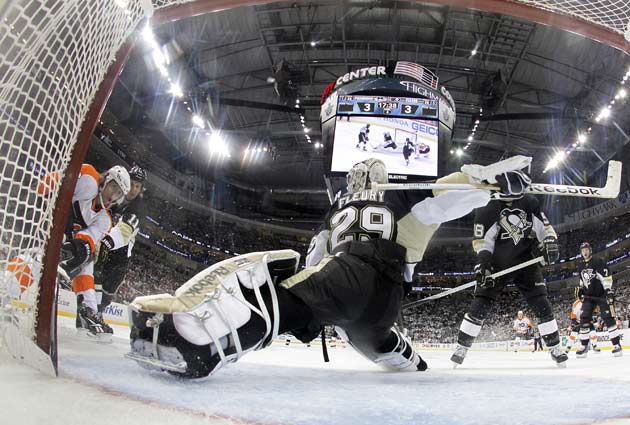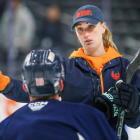
Let's call it prevent offense, and it's what caused a late-game collapse by the Pittsburgh Penguins on Tuesday night.
At various times the past two seasons protecting two-goal leads has been an issue for the Penguins. It's been especially true in games against the Philadelphia Flyers.
The past three games they've lost to their cross-state rivals, including Tuesday's 4-3 overtime loss in Game 1 of their Eastern Conference Quarterfinal series, involved the Penguins letting multiple goal leads slip away.
The Penguins spent less time in the offensive zone and tried to make too many fancy plays instead of the simple, smart plays that put more pressure on a defense.
On March 18 in Philadelphia the Penguins lost in overtime after opening the third period with a 2-0 lead. On April 1, a game that involved the now infamous scream-fest on the benches between the coaches, the Penguins scored twice in the first five minutes and ended up allowing Philadelphia to score six of the next eight goals over the remainder of the game.
On Tuesday, it was a three-goal lead that slipped away.
A lead they had multiple opportunities to expand, including three consecutive power plays (a seemingly rare occurence in the playoffs) in the second period. They failed to convert on all of them, and after Philadelphia scored immediately following the first penalty kill (on the Danny Briere offside goal) the floodgates were opened for a Flyers comeback.
The attitude in the Flyers locker room after the game seemed to be that some of the younger guys were a bit overwhelmed by the stage early on. There was a lot of standing around as players were caught in bad positions, left unready for the intensity of the playoffs. It not only showed on the scoreboard, but in the way Pittsburgh completely controlled the game, outshooting Philadelphia by a 13-6 margin and keeping the puck deep in the Flyers zone for pretty much the entire period.
It's the way Dan Bylsma wants his team to play, and the way they need to play if they're going to be successful.
But for as dominant as they looked in the first period, everything switched when the Penguins entered the prevent. The Flyers were able to shake off a disastrous first period. Peter Laviolette stuck with Ilya Bryzgalov when he could have easily made a switch to Sergei Bobrovsky. Briere took over, as he always seems to do in the playoffs, scoring a pair of goals including the now disputed second period goal to jumpstart the comeback.
When asked if there is a safer way for his team to protect a three-goal lead Bylsma simply said, "I think playing our game would be safer."
And that is simply what they did not do.
Philadelphia simply shut them down for the remainder of the game. After recording 13 shots in the opening 20 minutes, the Penguins managed just 15 the rest of the game, including zero in overtime. Few of the shots they managed were quality scoring chances or quality looks.
This isn't something that's unique to the Penguins. Every team in the league adjusts its game when it has a multiple-goal lead but Pittsburgh seems to struggle more than others to find that happy medium between being recklessly agressive and being needlessly passive.
It's not a good way to win a playoff game, as the Penguins found out on Tuesday.
For more hockey news, rumors and analysis, follow @EyeOnHockey and @agretz on Twitter and like us on Facebook.

















